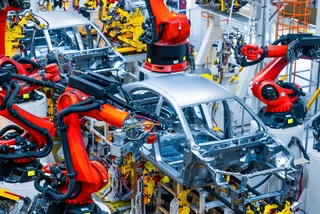Czech industry leaders warn that new U.S. tariffs on imported vehicles will weaken the country’s economy by disrupting supply chains and reducing demand for Czech-made automotive components. The tariffs, set at 25 percent on all foreign-made cars, were announced by U.S. President Donald Trump and will take effect on April 2.
Although direct Czech vehicle exports to the United States are minimal, the broader European automotive sector, which Czechia is deeply integrated into, is expected to suffer. According to the Confederation of Czech Industry, machinery and transport equipment worth CZK 71 billion were exported to the U.S. last year, a significant portion of which came from the automotive sector.
The Czech automotive industry is heavily dependent on supplying components to German manufacturers, which will be hit hard by the tariffs. Industry analysts warn that a decline in production by European automakers could cause a cascading effect, impacting hundreds of Czech companies in the supply chain.
“Czech exports are characterized by a high proportion of products intended only for specific customers, especially in car production and spare parts. This will not contribute to investment activity and will harm both the EU and U.S. economies,” Lukáš Martin, director of the Confederation’s international relations section, told Czech Television this week.
Škoda Auto, one of the country’s largest automakers, expects further consequences beyond declining exports. The company predicts that restrictions on Chinese car sales in the U.S. will force Chinese manufacturers to flood the European market, intensifying competition and putting additional pressure on European carmakers.
“We rely on constructive negotiations between business partners to ensure planning security and economic stability while avoiding a trade conflict,” said Tomáš Kotera, Škoda’s head of communications.
The Czech Chamber of Commerce has also voiced concerns that the tariffs will significantly disrupt the country’s industrial sector. “The restriction on European car exports to the U.S. will immediately translate into reduced demand for Czech-made components, affecting hundreds of companies,” said Chamber President Zdeněk Zajíček. He also warned that tariffs could be extended to key automotive parts such as gearboxes and electrical systems, where Czech manufacturers play a crucial role.
Zajíček criticized the move, arguing that it would increase uncertainty in global trade. “Trade barriers do not bring solutions; instead, they lead to economic fragmentation. Industry needs predictability, stability, and cooperation,” he said.
Industry leaders are now calling on the EU to take action. “Countermeasures should be legal, proportionate, and targeted, with the goal of eliminating tariffs and ensuring greater market access,” said Martin.
As European manufacturers brace for the impact, analysts predict higher vehicle prices for U.S. consumers and declining sales, potentially deepening the economic strain across both regions.












 Reading time: 2 minutes
Reading time: 2 minutes 























